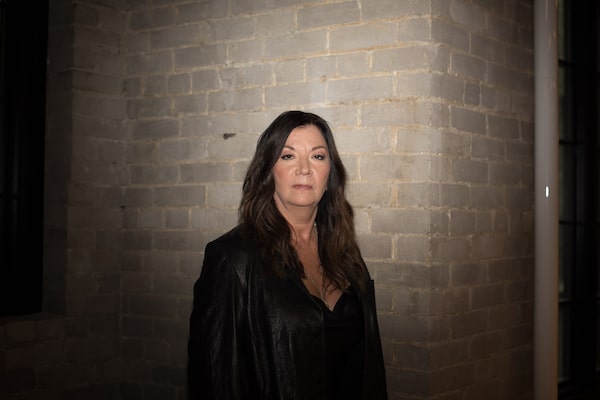
Marie Clements, the writer and director of the film Bones of Crows, in Toronto, on Sept. 11.Tijana Martin/The Canadian Press
It was soon apparent to writer and director Marie Clements that a limited miniseries would not be enough to contain the multigenerational tale of an Indigenous family at the heart of her latest project, Bones of Crows.
The Vancouver-born Dene/Métis filmmaker says the sweeping story was initially envisioned as a four-part TV venture, but plans grew to a five-part miniseries, and then again to a five-part miniseries plus a feature film.
That two-hour feature premiered at the Toronto International Film Festival one year ago, and this week the small-screen version for CBC and CBC Gem fleshes out characters and relationships for a more-thorough look at an Indigenous family over some 90 years.
While the movie focused on the turbulent life of Cree matriarch Aline Spears, Clements says each hour-long TV episode delves into the myriad trials faced by Aline’s siblings and family members, offering an opportunity to explore new layers to the impact of decades of systemic racism.
“This time we get to see the stories of her sister, the stories of her brother and her kids,” says Clements, who shot both versions at the same time.
“We get to see and breathe in the other points of view of her family and what they went through and how that relates to her and how it relates to their story as a family unit over decades.”
Aline Spears’s story begins in 1930s Manitoba, in a happy, music-filled household suddenly shattered when she and her siblings are forced into residential school and then separated. As an adult, Aline becomes a code talker in the Second World War, marries and has a family but increasingly finds it impossible to ignore her traumatic past and continuing systemic racism.
The largely Indigenous cast includes Graham Greene, Lorne Cardinal and a cameo by veteran documentary maker Alanis Obomsawin.
Secwépemc actress Grace Dove, who stars as Aline from the ages of 16 to 70, points out that the shooting schedule was not chronological, adding a further acting challenge to the emotionally demanding material.
“This one was incredibly challenging, because one day, I’m 30, and then the next day, I’m 60,” she says, nevertheless calling the gig “the actor’s dream.”
“If I had a choice, I would have said, ‘So we start at 16 and then we go in till I’m 70, right?’ But no, my first day, it was a very, very terrible scene, very hard scene, very traumatic for me, very triggering and I remember thinking, ‘Come on, guys. We can’t figure out a better schedule?’ ”
Child actress Summer Testawich plays young Aline while the performer known as Carla-Rae depicts the older Aline. Dove says she spoke with her younger and older counterparts to ensure continuity.
“I had a little chat with the younger version, Summer, just to support her and let her know my choices and where I’m going with the character. But she’s young, so I can feed off her,” she says.
“And then I remember Carla-Rae is such a hero, she came in very late, learned so much of the language. I just said: Remember that I was in the war, so there’s something about growing up in the thirties and having [body] structure that’s very different than a modern person today.”
The film and miniseries draw obvious parallels to other atrocities as the story jumps in time between the past and present, such as when Aline’s soldier husband and his squad liberate a concentration camp in the Netherlands and that triggers flashbacks to his own time in residential school.
Clements says she hopes these connections help non-Indigenous audiences grasp the continuing damage and trauma inflicted by decades of systemic racism that include disproportionate incarceration rates of Indigenous people and an epidemic of missing and murdered Indigenous women and girls.
“Some things in racism have things that we can all understand. It’s not specific to who we are, directly, but we understand it. And I think [it’s about] creating an empathy between peoples and for non-Indigenous people to be able to recognize Indigenous people as human, as real human beings who had dreams and who were a part of the world, and still are.”
Bones of Crows begins Wednesday on CBC and CBC Gem.